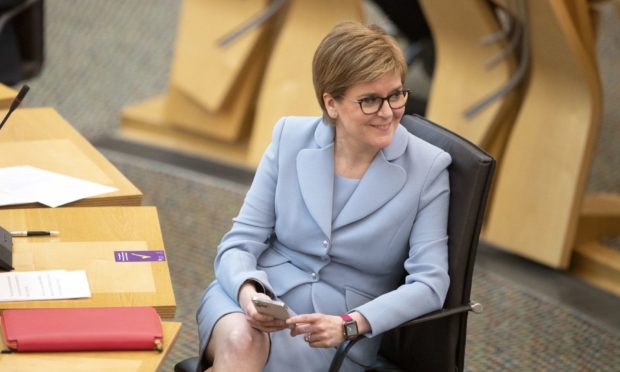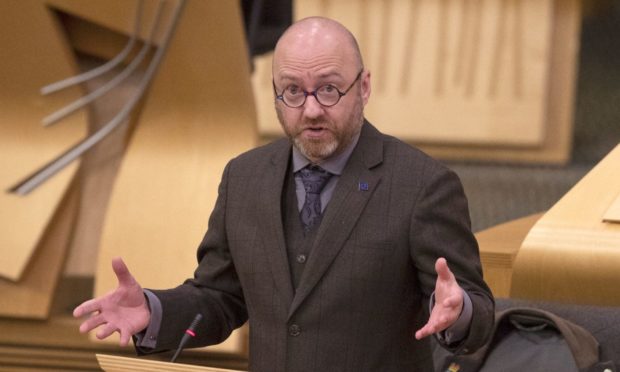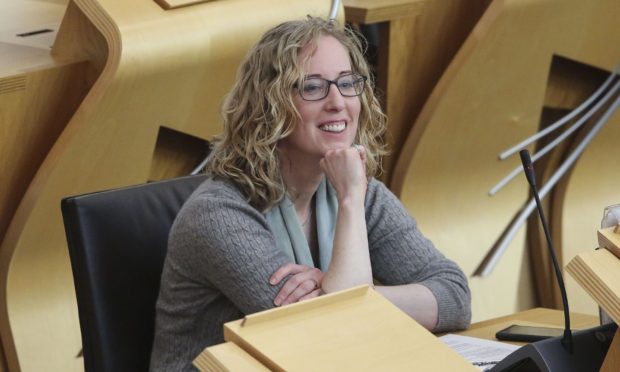The SNP and Greens could work together in a formal deal in government, the First Minister announced.
Nicola Sturgeon said talks are under way on specific policy areas for co-operation.
“It is not inconceivable that a cooperation agreement could lead in future to a Green minister or ministers being part of this government,” Ms Sturgeon said in a statement at Holyrood on Wednesday.
“The key point for today is that we are both agreeing to come out of our comfort zones to find new ways of working for the common good.”
Informal talks have been held since the election on May 6 but neither party had committed to anything more formal in the run up to the vote.
Officials from the civil service are now supporting talks on “ground-breaking” ambitions, which Conservatives claimed was a “nighmare scenario” for the oil and gas industry.
Ms Sturgeon made the remarks while updating MSPs on what the SNP government intends to do in its first 100 days.
Ms Sturgeon said: “I can confirm that the Scottish Government and the Scottish Green Party will enter structured talks, supported by the civil service, with a view to reaching – if we can – a formal cooperation agreement.
“Exactly what the content, extent and scope of any agreement will be is what the talks will focus on.
“And, of course, any agreement that emerges from these talks will be subject to the necessary approval processes of the Cabinet and each of our parties.
“But what we hope to achieve is potentially ground-breaking.”
‘Green recovery’
The SNP fell short of a majority in the election but are still by far the largest party.
With the Greens, they have a working majority and form a pro-independence bloc at Holyrood.
Scottish Greens co-Leader Lorna Slater said: “Scotland desperately needs a green recovery from the pandemic that leaves no-one behind, while time is running out for meaningful action on the climate emergency.
“The Scottish Greens have always worked constructively with other parties, delivering meaningful change, like free bus travel for young people, and earlier this month the public returned the largest-ever Green group to parliament to take that work further and faster.
“We hope that through these talks we can deliver real change.”
The Greens said they have drawn from the experience of their colleagues in Green Party of Aotearoa New Zealand.
Green co-leader Patrick Harvie added: “Green parties across Europe and in countries like New Zealand have in recent years rolled up their sleeves and worked with other parties to deliver a better future.
“But they have also shown that there is more than one way for government and opposition parties to work together, without losing the ability to challenge one another.”
‘Nightmare scenario’ for oil and gas industry
Scottish Conservative energy spokesman Liam Kerr, a North East MSP, said a coalition would be a nightmare for the oil and gas industry.
In a statement, he claimed: “The Greens seem to have finally given up pretending to be a separate party from their nationalist allies. Once again, we see that their true colours are not green but SNP yellow.
“A more formal SNP-Greens coalition is a nightmare scenario for the 100,000 workers in Scotland’s oil and gas industry, who will be concerned that their jobs are at immediate risk.
“The potential economic damage could have wider consequences beyond the oil and gas industry. This is a coalition of chaos that could put Scotland’s entire economic recovery at risk by pushing for another divisive referendum while we should be fully focussed on tackling the devastating long-term impact of the pandemic on jobs and businesses.”
Independence
In parliament, Ms Sturgeon underlined the combined weight of the SNP and Green “mandate” for another independence referendum in a challenge to Conservatives including Prime Minister Boris Johnson.
She said: “There is no justification for the UK Government seeking to block that mandate. To do so would suggest that the Tories no longer consider the UK to be a voluntary union of nations. And it would be profoundly undemocratic.”
The future make-up of the government, and calls for a referendum, were contained in wider comments about recovery from the covid pandemic and what to expect in the coming weeks at Holyrood.
Ms Sturgeon promised the first 100 days of her new government will see a consultation take place on setting up a National Care Service – hailing this as “the most important public sector innovation” since the NHS was established.
The 100-day plan will also see the “first phase” of work to recruit 3,500 more teachers and classroom assistants for Scotland’s schools, in a bid to help youngsters whose education has been disrupted by coronavirus.
How did the opposition parties respond?
Scottish Conservative leader Douglas Ross said it took just 15 seconds for independence to get another hearing.
Mr Ross told MSPs: “Nicola Sturgeon speaks of bringing people together then pushes the most divisive proposal imaginable. This isn’t a speech to unite Scotland, it is not a statement of the people’s priorities, it is a regurgitation of the SNP’s top priority.”
Scottish Labour leader Anas Sarwar referenced previous support the Greens have given the SNP in budget votes, saying it is “good to see the Greens formalising and accepting their longstanding coalition of cuts”.
He added: “Let’s be clear this isn’t day one of an SNP Government. It is day 5,136. If the First Minister is serious about focusing on recovery, she must commit in the first 100 days to make this recovery meaningful.”
Scottish Liberal Democrat leader Willie Rennie said the “emerging Green pact is a sign that independence is the overriding priority”.
He added: “The First Minister promised this would be a Parliament focused on recovery and she would defer a referendum until the effects of the pandemic were over.
“I’m disappointed to see the First Minister announce plans which would push the recovery aside.”


